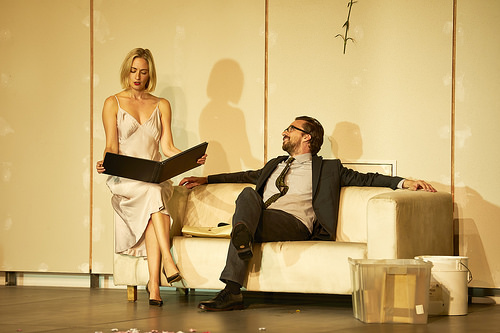There is no music as the audience enters. The dim-lit stage is filled by the sound of random piano keys bashed out by a lady in black – the corrupting, conniving, and callous Hedda Gabler.
Played by Lizzy Watts, Hedda sits over her piano in the middle of the stage, set as a modern but undecorated apartment. There are a few possessions scattered around: a couch, a bay window, some flowers and, of course, her guns. She is both beautiful and evil; married because “it was time” and bored because of it: “It is intolerable to be stuck with one person always and eternally.” She has returned from her honeymoon with the charismatic and, for Hedda, ultimately boring Dr Tessman, an academic who spends most of his time researching and being spoiled by his aunt, Julianna. He sees Hedda as property to which he has “privileged access”, but Hedda sees Tessman as a joke: “Imagine the hilarity of watching him fail!”
Watts, whose previous theatre roles include Strife and The Angry Brigade, gives a powerful performance with Hedda, balancing her world weary-soul with her youthful beauty. Tessman, played by Abhin Galeya, is also a strong portrayal of a feisty young professional on the brink of success.
Henrik Isben’s Hedda Gabler demonstrates that women are more than wives or mothers. Hedda rises above the most conventional norms. She is wild, rejecting society and morality and despite being surrounded by wealthy academics, she is by far the most intelligent. Despite her insatiable desire for destruction and her cold manipulation, she is a profoundly likable character.
The characters love her too; they lust for her, and she knows this. They visit her flat and she becomes obsessed with them. She uses their hearts, egos and minds against them holding the power effortlessly. She pulls their strings as the plot reaches its boiling point – but her orchestrated madness can only go so far. Characters run off stage and disappear into the real world where Hedda refuses to go. She is often left alone with her maid in her large apartment, with walls made of tall plasterboard rectangles, eerily resembling a cage.
Other characters such as Judge Brak (Adam Best) and Mrs Elvsted (Annabel Bates) who is returning to the role after the sell-out performance at the National, are played well; but there are moments in the play where powerful lines aren’t delivered as such. There is a mix of emotional and comical scenes, but even at the explosive climax the acting feels a bit forced, leaving some members of the audience chuckling at inappropriate parts.
The production is elegant in many ways – set, music, design – with only a few failed lines and awkward moments. However, this play contains strong messages of power, society, and female oppression which, for a play written in 1890, still holds strong today, perhaps making Hedda Gabler’s current timelessness a saddening reality.
